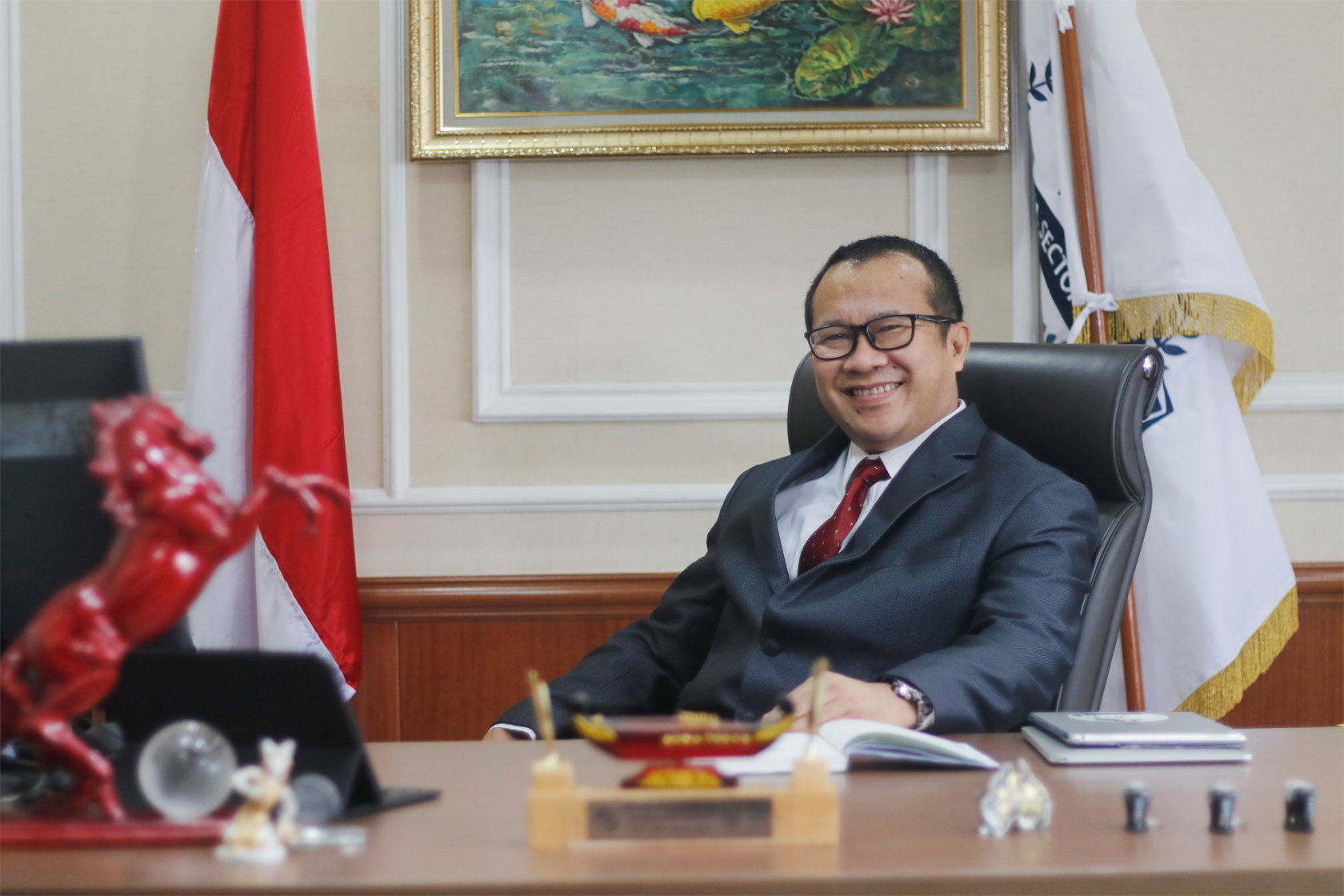As part of the team that drafted Indonesia’s economic policy responses to the COVID-19 pandemic, Australian alumnus Dr Adi Budiarso started by looking at the bigger picture.
In July 2020, the Indonesian Government launched the National Economy Recovery Program (Program Pemulihan Ekonomi Nasional, or PEN) to support the public health and economic sectors severely hit by the pandemic.
Dr Adi, now Head of the Center for Financial Sector Policy at the Fiscal Policy Agency, Ministry of Finance, first looked at the overall picture.
“There is a saying that I love, ‘Think big things’,” said Dr Adi, who at the time was Head of the Center for Climate Change Finance and Multilateral Policy. “What it means is that we have to start everything from the big picture. Think big things—the vision—then act and nurture persistent change and reform.”
Approximately AUD 64.63 billion was allocated to the National Economy Recovery Program budget, and by the end of Q4 of 2020, as much as 83.4% of it had been disbursed to fund various sectors such as the health and micro, small, and medium enterprises (MSME) sectors, as well as supporting social safety net programs through direct social assistance, subsidies for electricity, among others.
Dr Adi believes that by starting from the big picture, a country can assess the magnitude of the problem, benchmark against other developed countries, and eventually appreciate its own abilities and adapt them to its unique needs.
“There were two issues that Indonesia needed to address: national health resilience against the pandemic, and a measured economic recovery,” said Dr Adi, who obtained his PhD in Business Administration from the University of Canberra in 2013 under the prestigious Australian Leadership Awards, funded by the Australian Government.
One of the goals of the National Economy Recovery program is to promote financial inclusion and financial literacy. Social assistance is disbursed through public banks and private financial technology (fintech) companies, encouraging people to use financial institutions instead of relying on cash.
Dr Adi explained that by encouraging economic participation, the money that enters the economy can circulate even further. “These are a few of the efforts we pushed to support the financial sector so it can recover, and the government can execute its intermediary role,” said Dr Adi.
The Fiscal Policy Agency is also working on the Development and Strengthening of the Financial Sector Draft Law to further support Indonesia’s economy, taking into account the rise of fintech.
Dr Adi said Indonesia’s Minister of Finance, Sri Mulyani, regards the Agency as the nerve centre of the Ministry’s policies, working closely with all ministries in drafting the National Economy Recovery Program and the Development and Strengthening of the Financial Sector Draft Law.
Dr Adi remarked on how the COVID-19 pandemic had accelerated the process of reforming Indonesia’s fiscal policies and laws so its economy will not only survive, but thrive in the era of digitalisation.
“An unprecedented and extraordinary crisis indeed triggers a policy response that requires collaboration and synergy, something that is as important as looking at the big picture,” Dr Adi said.
This philosophy was shaped by Dr Adi’s experience during his studies in Australia. He was amazed at the opportunity to observe the Australian financial system and how and why it was able to recover from the 2008—2010 global financial crisis.
“I had so many opportunities to study the big picture,” Dr Adi said.
Dr Adi and his fellow Indonesian scholars, both awardees and recipients of other scholarship programs, also built up a network. These scholars from the Ministry of Finance, the National Development Planning Agency, Ministry of Health, and other ministries would often meet up for discussions.
Today, the network continues to facilitate discussions and progress on the drafting of the National Economy Recovery Program policies.
“We studied the same lessons learned, we had the same benchmark. It fostered an understanding when we implemented our knowledge in our areas of expertise,” Dr Adi elaborated.
The Indonesian Fiscal Policy Agency is also involved in regular high-level policy dialogues with Australia’s Department of Treasury. In late 2020, following a meeting with Sri Mulyani, Australian Treasurer Josh Frydenberg committed to provide Indonesia with a stand-by loan of AUD 1.5 billion.
“The Australian support for Indonesia is as big as that: a commitment,” Dr Adi remarked. “We have a long history of partnership with Australian institutions—a very close one, even at the leadership level.”
The Fiscal Policy Agency also routinely engages with the Australia Indonesia Partnership for Economic Development (Prospera) through its Technical Assistance program. Prospera is a grant-funded partnership between Australia’s Department of Foreign Affairs and Trade, and Indonesia’s Coordinating Ministry for the Economy.
To achieve a balanced approach for Indonesia’s economic recovery, the regulatory framework cannot remain static in a changing world. Dr Adi said the multi-ministry team continues to closely monitor the National Economy Recovery Program, re-focusing policies and drafting changes when necessary.
“We have to continuously check and re-check. Indonesia’s policies must be solid. They must be anticipative, responsive, and trustworthy. We have to ensure that,” Dr Adi stated.
“We can work towards a better Indonesia by starting with the big picture, and through networking and collaboration in this era of digitalisation.”
Photo courtesy of Dr Adi Budiarso



 Starting with the big picture to support Indonesia’s economic recovery
Starting with the big picture to support Indonesia’s economic recovery